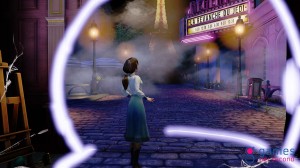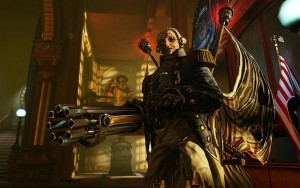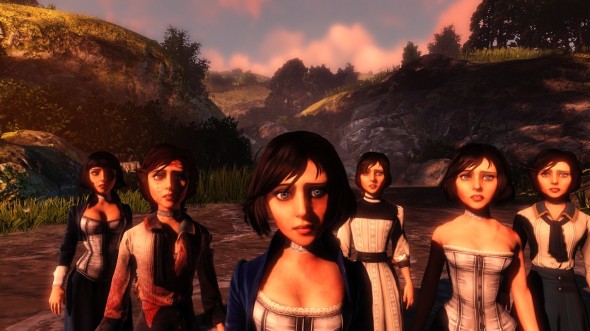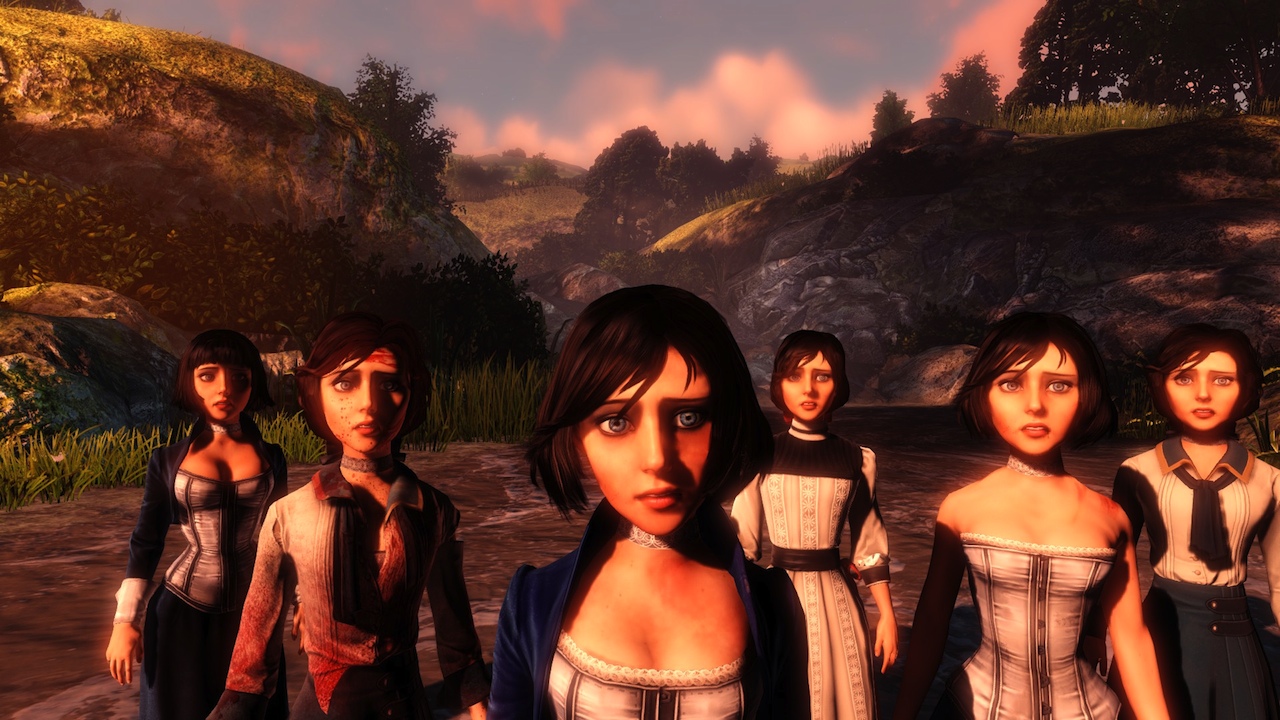(Enjoy this guest post on Bioshock Infinite by C. Lenz – Ed.)
As the technology behind video games becomes more and more powerful, it becomes possible to create worlds that mimic reality, with the freedom to make ethical choices and experience the consequences of those decisions. Although the plots, settings and characters are written and designed by teams of artists, any and all aspects of games might be altered to show the effects of the player’s actions. In Bioshock Infinite, however, these kinds of choices exist only to illustrate that the player is merely offered the illusion of freedom.
First, some background:
You play as Booker DeWitt, a private investigator with a sordid past. You’re (supposedly) tasked with rescuing a young woman, Elizabeth, from the flying city of Columbia, which is entered through a lighthouse off the coast of Maine. Elizabeth has been held prisoner for her entire life by her father, Zachary Comstock. Along with Comstock’s Disney-villain-esque evil of keeping his daughter captive, he’s also a white supremacist who has used the city of Columbia for such charming acts as slaughtering Chinese dissidents during the Boxer rebellion.
(As an aside, you’ll probably notice I sometimes call Bioshock’s protagonist Booker, and sometimes ‘you’. This is intentional. One of the greatest advantages of video games as a story-telling medium is the strong identification between the player and the character they control. This forces the player to not just sympathise for the protagonist, but also to feel some responsibility for their actions.)
Soon after meeting Elizabeth, you learn she has the power to tear holes through time and space. At first this is only used to grab supplies and manipulate the environment to your advantage, but as the plot progresses, you begin to go through these tears into parallel universes.
These parallel universes are the result of different paths being taken. Think of it this way: if you flip a coin, it could come up heads or tails. In the world of Bioshock Infinite, it’s not that the coin lands on heads approximately 50% of the time and tails the rest of the time, but rather that the universe branches, creating one reality where heads comes up, and one where tails does. Flip the same coin one hundred times, and eventually there will be countless (OK, technically 2100) nearly identical universes, the only difference being the outcomes of the coin flips. In one of these realities, heads will have come up all 100 times, as demonstrated by two characters in Bioshock, the Lutece twins, early in the game.
I hope you’re following so far, because this is where it gets confusing.
At the very end of the game Elizabeth gains the power to see not just her universe, but all universes as they really are. She takes Booker on a trip through several, showing you an ocean full of lighthouses, all exactly the same as the one from the start of the game, all complete with their own versions of Elizabeth and Booker going through the same drama. The unfortunate upshot of these infinite realities is that, despite Comstock’s death at Booker’s hands in one reality, he still exists to continue his reign of oppression in infinite others. Elizabeth’s take on all this? “It will only be over when [Comstock] never even lived in the first place.”

Booker immediately agrees, and Elizabeth takes him to a scene that was shown earlier in the game: a river where Booker was once nearly baptised to atone for his past, only to reject the ceremony, not believing that “a dunk in the river’s gonna change the things [he’s] done.” It is here where we realise Booker’s two potential futures branching from the moment in which he chose whether or not to get baptised. In one, he accepts that forgiveness for any act comes easily, so long as he asks, and becomes Zachary Comstock. In the other, he decides that atonement requires a greater sacrifice, and later sells his infant daughter (who grows up to become Elizabeth) to Comstock. To prevent the events of the game before they’ve even begun, Booker submits to drowning at the hands of several alternate versions of Elizabeth, all but one of which blink out of existence afterwards, before the screen fades to black.
Throughout the game, Booker and Elizabeth talk about choice and how to make up for the consequences of their actions. By the end, however, their dialogue reveals that there are no decisions, only what they will or will not do. Booker tells Elizabeth that “No one tells [him] where to go” – a fascinating choice of words for the main character of a video game whose sole function is to be told where to go by the player. A few minutes later, as Booker stands next to his daughter’s crib, telling Elizabeth there’s no way he’d give her away, she replies “You don’t leave this room until you do. You can wait as long as you want.” On the surface it’s a statement about what Booker will do at the behest of Comstock, but in truth it’s about what the player will do at the behest of the game’s writers.
All gamers are familiar with some version of this scenario. Some aspect of the game, maybe some text on the screen, a disembodied voice, or a character, tells you what you have to do next. You’re not given any alternatives. It doesn’t matter whether you think it’s the right thing to do, or if you want the inevitable results of your actions to come to pass. It’s not a new observation, but Bioshock Infinite explicitly points it out. In the context of video games, if the player is told they can’t progress unless they kill the man in front of them, then it doesn’t matter how long they stand there. The only option is to do what the game designers say, or don’t play at all.
In fact, it goes even deeper than that. It’s true that the world of Bioshock Infinite would not exist if it weren’t for a long list of writers, artists and programmers, but all of that would be meaningless without a machine to render it and a player to explore it. The act of loading Bioshock on the gamer’s PC or console creates Columbia and everything within it. When Elizabeth shows you the ocean full of lighthouses and the infinite iterations of herself and Booker, she is telling you that every person playing the game has initialized their own version of Bioshock Infinite’s universe and colored it with their own decisions.

Many modern games offer players moral choices with some small impact on the course of the plot, usually in the form of two endings, one good and one bad. Bioshock Infinite, however, posits that these choices don’t matter. The very fact that both paths exist means they must, in fact, already have been taken. By starting the game, the player has created a world which can only be filled with violence, as this is the path that the game designers have written for the player to follow. The only choice Bioshock offers is to play or not to play, giving potential players the opportunity to end the events of Bioshock’s plot before they even start. Similarly, after Booker is drowned in the game’s final moments, the fade to black does not indicate the end of the game, but the obliteration of Bioshock’s universe before it was even created.
This can be extended to the real world. It may seem far-fetched to apply the philosophy of a game that involves battles with animatronic George Washingtons, but one interpretation of quantum mechanics, the many-worlds interpretation, assumes the universe functions like Bioshock’s, branching at any point that can have more than one outcome, effectively exploring all possible outcomes. The fact that a universe which contains violence is within the realm of physical possibility means it must happen. Since all living, thinking beings have the potential to make choices that would result in the pain and suffering of others, there must be at least one reality where they have. It is impossible to distinguish between a course of action that exists, and a course of action that has been taken, since the former necessitates the latter. The only way to truly ensure a particular path does not end in suffering is to prevent it from starting. According to Bioshock Infinite, the only truly ethical existence is non-existence.
Early in Bioshock Infinite, Booker does accept a baptism. He has to; it’s his only means of entering Columbia. When he’s held under water long enough to pass out, he comments that the “priest needs to learn the difference between baptising a man and drowning him.” In the ethical framework of Bioshock, however, drowning is the only effective baptism.

C. Lenz has a bad habit of playing video games until her eyes bleed. Between bouts of writing (both fiction and non-), she is attempting to explain the mysteries of high substitution rates in the vicinity of low-complexity protein-coding DNA.

Just because I have the choice of turning left or right when I get to a fork in the road doesn’t mean that there, of necessity, exists a universe where I made each choice.
That depends entirely on your interpretation of quantum mechanics. That said, I’m not an expert, and I cheerfully admit that I prefer many-worlds because it’s so science fictiony.
I was about to comment something very similar. Also not a quantum physicist, but my understanding (based on what I’ve been able to glean from Star Trek & other pop culture) is that the universe “splits” into two parallel universes only when the chances of two different events happening are equal. So the “coin flip” example works, but for the choice of turning right or left example Sprugman suggests, you wouldn’t get the parallel universes if you were heading to a specific destination that could only be reached via one particular route.
I think talking about parallel universes can also open a can of worms re: nature vs. nurture. If you believe people are who they are because of genetics or some inherent nature of a person, (i.e., Jane Doe will always be kind and gentle regardless of her circumstances) then you can’t have infinite parallel universes. Or, maybe they could be infinite, but most would be very similar to one another. If you believe that people are who they are because of circumstances (i.e., Jane Doe would be a violent psychopath if she was raised by different parents), then yeah, the infinite parallel universes. Woo!
Alright! I get to pull out my WELL-ACTUALLY canon!
Beginning at the narrative level and working backwards keeps you trapped in a “Weak Mis-Interpretation”.
If you want to write (or deeply understand) good Sci-Fi you’ll need to learn a key element; the root of the Many Worlds hypothesis is an effort to establish a theory of universal determinism at a quantum level. (I know, right?)
I’m not going to get into Wavefunction Collapse, Quantum Decoherence, and “What Schrodinger was really talking about”. I’ll just make some assertions that are objectively wrong but subjectively right.
Start with the concept of Determinism. This theory posits that given sufficient data, sufficient intelligence, and the proper formulae then we would see the inevitability of any event.
It’s a very sciency way of looking at things, and cleans up a lot of messiness by explaining Free Will and Chance as illusions resulting from insufficient data. (Please stick close to your tour guide. Avoid the door on the left labeled “Nihilism” and on the right labeled “Predestination”.)
But this sort of coherent linear determinism breaks down when quantum theory is subjected to various thought experiments and practical laboratory observations.
One way to reconcile this conflict is to bring chance back into the theory, but determinism + chance = broken.
So the concept of “pure chance” is eliminated by saying “All possible states of Quanta exist simultaneously, what we see as chance is the sum of quantum states observed by our ‘reality'”.
Thus every shift in state for a quantum particle must represent a new derivative ‘reality’. Each derivative ‘reality’ exists in parallel to all other possible states of that quanta, and therefore in parallel to all other infinite combinations of quantum interaction on the macro level.
This is a really complicated way of saying “The universe does not branch when you make a choice. The universe branches so rapidly and infinitely that every non-zero probability will be fulfilled from some observable point.”
Rather than ask Nature vs Nurture, this whole theory presupposes that ‘choice’ itself does not exist.
Thought Experiment:
If you find someone who deeply believes this theory try giving them a good slap in the face and ask them to explain why probabilistic inevitability means that you had no choice in that action.
Conclusion:
The whole concept is a philosophical dead end, a universe without choice, chance, or consciousness. But it IS a fictional gold mine, because a Strong Mis-Interpretation of the theory turns it into an infinite supply of choices, chances, and consciousness that is capable of observing them.
Ain’t people amazing?
ps. there is no universe anywhere where this post is awesome.
For an even worse mis-reading of the MWI and its implications for fiction, you might be interested in:
http://www.overthinkingit.com/2012/03/15/inception-quantum-mechanics/1/
Very nice! I don’t know how I missed that one.
I glanced at it now, and will study it later. I’m a bit obsessed with Inception (and philosofiction).
I actually debated how to present the “single photon” scenerio in a brief way, and new I couldn’t pull it off. You do it well though.
It’s interesting to think of the Bioshock Inf philosphy and Inception philosophy side by side.
As presented here Bioshock weighs the Present against the whole sum of Future and Past, and narratively closes off the present that the future may live.
Inception does a similar weighing, but presents the past as a danger to the future and narratively closes of the past that the present may live.
Your conclusion misses the crux of determinism. It’s not that you have no choices*, it’s that there’s only one choice you will end up making.
Think of it this way: let’s say you could go back in time to an important decision in your life, but one of the quirks of this hypothetical mode of time travel is that you’re exactly the same you that made that decision. Same biases, same memories, same lack of foresight into the future, etc. Can you honestly say you’d make a different decision?
Determinism doesn’t sidestep nature versus nurture, since both your genetics and your experiences determine your personality. Determinism means that the state of the universe in the next time step is determined by its state in the current time step, and the nature and nurture of every person are a part of that state.
And also, a pet peeve: something being a philosophical dead end doesn’t make it untrue. The universe doesn’t exist to make us happy. The fact that we might find the conclusions of a scientific theory troubling or disturbing has no effect on reality.
*But yes, you’re absolutely right that it’s not choices, it’s about infinite branches throughout which everything physically possible happens. Describing it at the level of consciousness and not sub-particles that may be in one position or the other when the wave function collapses is more intuitive (and applicable) though.
“Same biases, same memories, same lack of foresight into the future, etc. Can you honestly say you’d make a different decision?”
No, I would fully imagine if “transported to that instance” that I would fulfill the path I started on.
The interesting question is “does all history proceed on unchanged? or is only that moment unchanged?”.
The philosophy of Hard Determinism moves ahead mathematically unchanged.
A quantum Multi-verse also moves ahead mathematically unchanged… since all possible scenarios existed each time.
In either view there is no nurture. Nurture is conceptually the combined influence of chance and effort over time. In a structure of “all chance is probability, and all probabilities will reach their potential” there is only persistent Nature not progressive change.
We’ve definitely got a bit of disagreement there, so I’m not going to push that button any further. :-)
However we don’t have any disagreement on the “philosophical dead end” peeve.
I actually mean that literally in this case.
MWI theory is a study of physics and refrains from commentary on the meaning or meaningless nature of existence. If you pursue the meaning of the theory, by the rules of the theory, no philosophy emerges. (except nihilism… but that emerges when you follow any path beyond the point of meaning)
The actual point was that we explore ethical implications by taking this untestable scientific theory and adding a fictional layer “What if we could travel across/between/backwards/forwards in many realities.”
SPOILERS FOR PERSONA 3. You have been warned.
Persona 3 a cross between a dating sim/high school simulator and a regular old RPG grind-fest. The game allows you a very high level of control. The protagonist never speaks, unless you chose what he says, even during cut-scenes. You chose what to do during your day, afternoon, or night. You chose which friendships and romantic relationships (social links) to pursue. But, at the end of the game, after you take down the boss, Nyx, you are forced to perform a move that uses up all your HP. You lose all memory of the bond you forged with your team while fighting the shadows/enemies.
You flash forward to a few months later, and you are forced to go straight to bed for several nights. When you attempt to select another option, the game reminds you that you are feeling very tired. After graduation, you go to the roof, although you (the character) do not know why. You (the player) remember that you (the character) made a promise to your friends to meet here on this day.
Having filled your promise, on this serene rooftop, you feel tired and must select between “close your eyes” and two other options that put you back into the loop. You must select “close your eyes” for the game to progress. You die, and the game goes to the credits.
The ending is known for its emotional impact. Having so many choices makes many players feel very close to the character, as if the character is an extension of the player. The character has no personality, save for the one you design for him.
I would think that the more choices a player has, the more she feels she controls the character, they more attached she is to the character.
You are misinterpreting the heads and tails description of multiple parallel universes. In the game the twins often speak about constants and variables. The chalkboard in the beginning of the game is proof. Every one of the infinite possible Bookers arriving in Columbia who flips that coin gets the same result. If the coin is the best evidence of a constant, the baptism is the variable.
If you think about it in terms of game design it makes sense. In an open world game there are infinite possible “universes”, but they are constrained.
Good point, I missed that! Definitely also a really cool statement on the nature of video games.
Great article!
When I read the title “To play or not to play”, I immediately started writing a Shakespeare/War-Games cross over in my head:
“To play or not to play; that is the question
Truly, the only way to win; is not to play.”
You’ve definitely captured some of B:I’s existential twists here, which I appreciate. It’s a genuinely convoluted application of physics and alterity to the standard narrative gaming experience. However, your reasoning leads you to a conclusion that I can’t entirely support. In particular, I don’t think this statement holds: “According to Bioshock Infinite, the only truly ethical existence is non-existence.”
The after-credits sequence sort of refutes this, creating a space for radical ethical freedom: a space-time pocket (or branch, or whatever spatial metaphor you want to use) where a third, reconstituted Booker can act ethically with regards to his daughter. According to my reading, this third Booker is one who has reconciled himself — not with baptism or penance, but with fatherhood — the first Booker that can see Elizabeth as a whole person, rather than an object to be put to use.
I elaborated a lot more on this idea in my own analysis of the game, which was published by Berfrois: http://www.berfrois.com/2013/05/jesse-miksic-existential-triad-in-bioshock-infinite/
Thanks for the article, I’m excited to see some well-considered interpretation applied to Infinite!
Nice work!
I haven’t played this yet, but I imagine if the game wasn’t so explicit about the lack of genuine control its player has, I would have felt very let down. I find moments in games where I’m given the option to do X or Y and there’s no real payoff, other than in that moment, end up causing boredom and dissatisfaction for me, at least.
Have you played the Telltale The Walking Dead game yet? The mechanic is very “choice”-centered. As another commenter said about a different game, the myriad choices the player makes causes the line between PC and player to blur, and by the end of the last chapter (it’s divided into chapters), it’s kind of hard to forget you’re you and not the character. And one of the snazziest things about it is that not only do other characters remind you of past decisions through dialogue (and sometimes their actions), but the end of each chapter shows some select choices you made and compares what you chose to other people on the network you’re using- “You and 56% of people chose to drink the milk,” for example (note: you never actually have to choose whether to drink any milk).
In the end, TWD does give a bit more freedom and there are multiple endings or ways things could wrap up- different people could end up with you in different parts of the game, they can live or die in different ways throughout, and some of the final decisions you make can lead to the ending being modified. And there’s no “good” or “bad” ending to it, which makes it pretty powerful. It’s a zombiepocalypse, after all, so you’re basically just going for the least bad. Unless, you know, you don’t. Heh.
Anyhoo, all that is to say, you’d probably enjoy TWD, but I’d be curious as to which is more enjoyable- a player thinking they have more control than they do, or being told blatantly they have none.
Also, DC’s multiple Earths thing can get pretty ridiculous. The plot of Injustice causes my Disbelief-O-Meter to rise slightly over the “Unsuspendable” level.
I never got around to playing the Walking Dead, although I might check it out soon. I was really intrigued to hear how much of the gameplay is based on dialogue choices and diplomacy, since I feel like that’s an aspect of post-apocalyptic survival that doesn’t get as much attention in fiction as it should. That and the fact that Telltale just produces solid games, and if anything I wouldn’t mind buying a copy to support them.
In general though, I’d say the illusion of control is more fun than being told there is none. Bioshock is, well, shocking only because it’s so rare for a game to make a meta-commentary on its own format like that. I definitely love when games have a statement they want to make (I’m on the “games are totally an art form” side of the debate) but if they all make the same statement that doesn’t really work anymore.